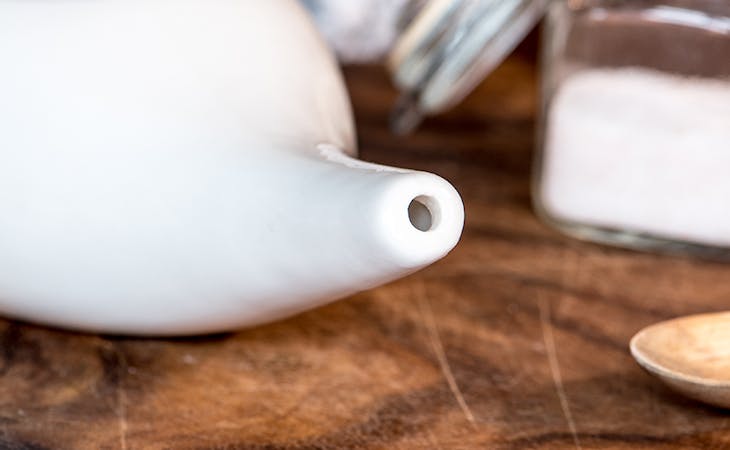Cold and flu season is upon us—and so, unfortunately, are the restless nights that happen when you’re under the weather. After all, if you’re stuffed up, feverish, or coughing, getting a good night’s sleep is challenging.
How having a cold or flu can affect your sleep
“When you sleep, the best way to breathe is through the nose,” says Darria Long Gillespie, MD, an emergency room doctor and author of Mom Hacks. “However, if your nose is stopped up, that can make it difficult, causing you to wake up more frequently or have a poorer quality sleep.”
Lying flat can also cause fluid in your nose to drain into the back of your throat, which can lead to that annoying coughing (and explain why people with a cold often find their cough worsens at night), Long Gillespie says.
Colds can last upwards of a work week, and the flu can linger longer—up to two weeks, says Long Gillespie, meaning you’re looking at quite a few nights of impacted sleep.
The aisles of drugstores seem to offer relief in every form imaginable, and in some situations OTC drugs are useful. “With the flu, sleep can be even harder due to fever and body aches,” says Long Gillespie. “In that case, it can be a good idea to take a medication such as acetaminophen or ibuprofen, which will help with both symptoms and hopefully let you get some rest.”
How to sleep better when you’re sick
But a trip to the pharmacy isn’t the only way to sleep more easily through the night. The next time you’re sick, consider these expert-backed medication-free remedies too. They’ll help you doze off, stay asleep, and wake up feeling a little more refreshed—even if you’re not feeling 100 percent.
Clear your sinuses before bed
Clearing out mucus and bacteria from your sinuses before you hit the sack can help relieve any discomfort you’re feeling and let you hop into bed a little bit more cleared up, says Long Gillespie.
“Before you go to sleep, the most effective way to clear your nasal and sinus passages is with irrigation such as a neti pot.” Find that too uncomfortable? A nasal saline spray may help, she says.
The National Sleep Foundation also recommends a hot shower to open your nasal passages before bed. This will not only loosen mucus but also help you relax—a win-win. (Here’s why bathing at night helps you sleep.)
Related: Should you share a bedroom with someone who’s sick?
Drink a cup of tea
Just as a hot shower might clear you up, so too might a steamy beverage such as a caffeine-free tea. Make sure to add some honey to your drink: It can act as a natural cough suppressant, which means you’ll likely sleep sans the fits that could otherwise keep you up. (Follow this tea-drinking routine for better sleep.)
Prop yourself up
“By keeping your chest and head elevated, you reduce the post-nasal drip into the back of your throat,” says Long Gillespie.
If you find that a cough keeps you up at night, elevate your head and torso. “The easiest way to do this is by backrest pillows, often called a ‘husband pillow,'” she says. “Turn it upside down so it’s just like a ramp, and sleep propped up.”
A pile of pillows works too, but it’s important to elevate your entire torso or you’ll just wake up with a crick in your neck, she notes. (An adjustable base allows you to elevate your head and torso as well.)
Use a humidifier
Keeping your airways moist is key for reducing congestion and helping you feel more comfortable, says Long Gillespie. A humidifier is one good way to keep your nasal passages moister, she notes.
Plus, because humidifiers naturally increase the comfort level in what’s likely already a dry room due to winter heaters, they could be good additions to your sleep routine even if you don’t have a cold.
For more winter sleep solutions, check out our guide to cozying up your bedroom for winter.




